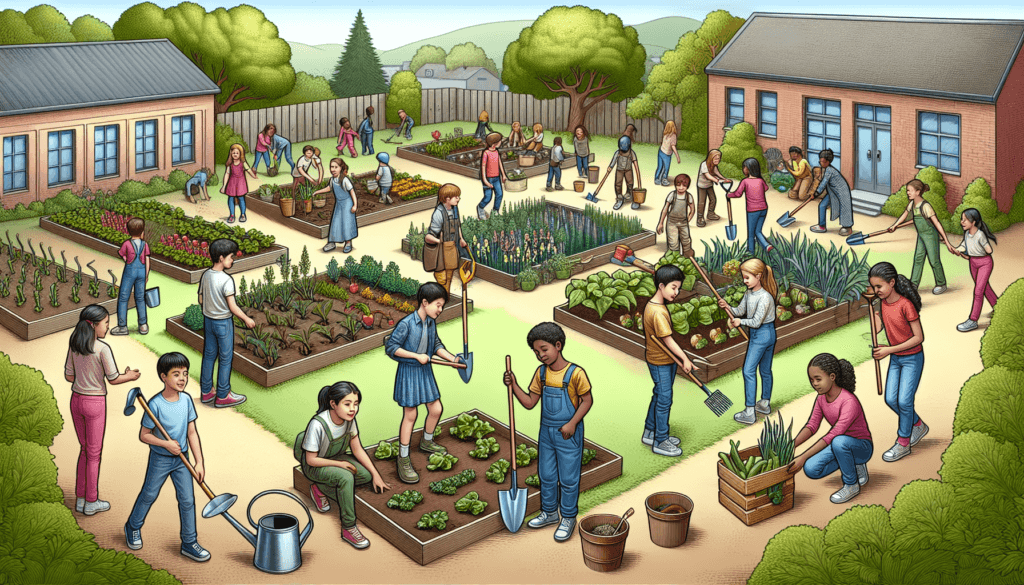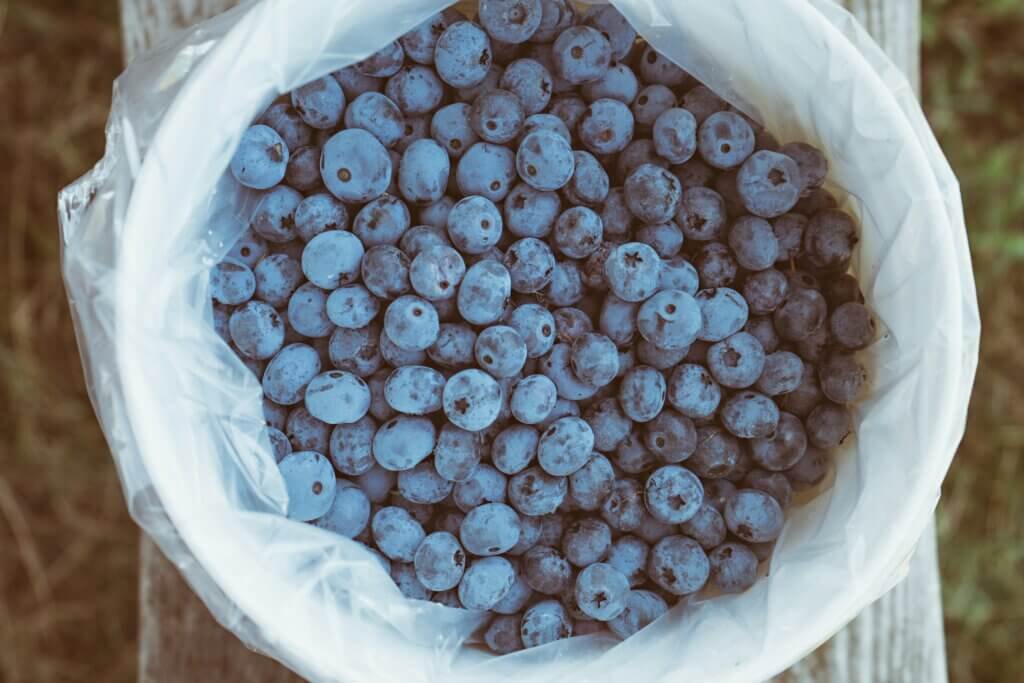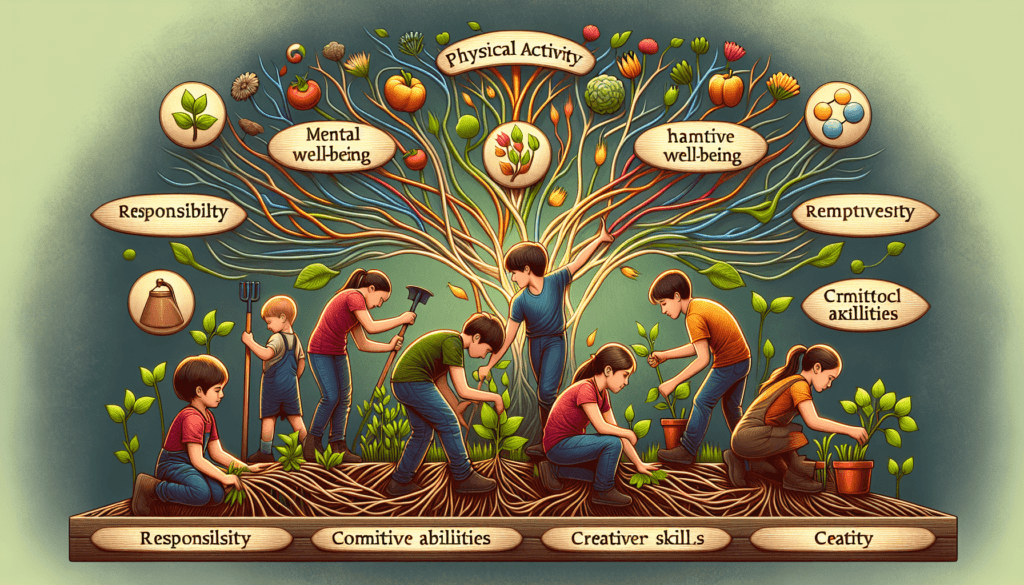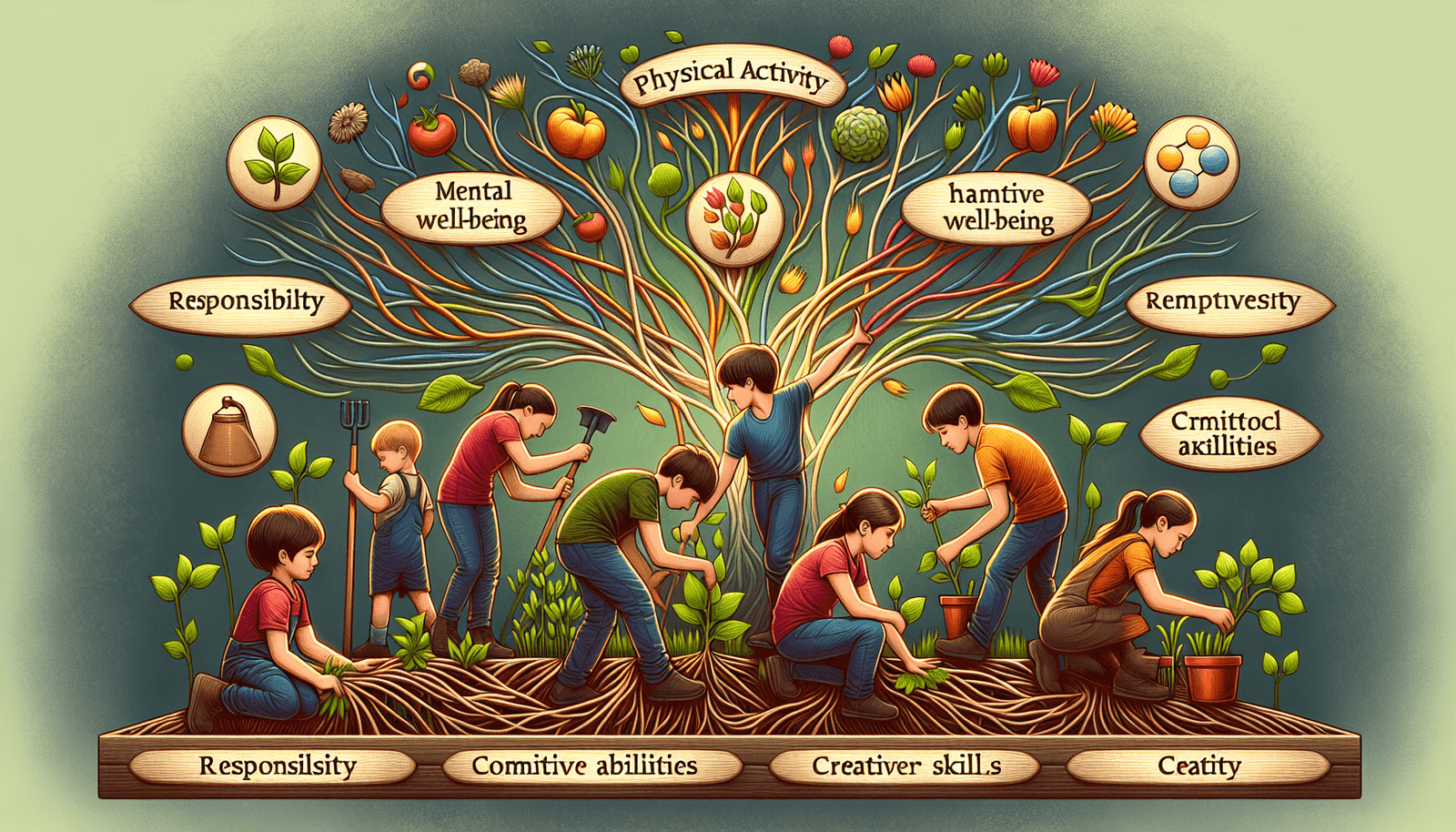Have you ever wondered about the incredible benefits that gardening can offer to students? From improving mental health to enhancing academic performance, this ancient practice has been found to have a profound impact on students’ overall well-being. In addition to fostering a sense of responsibility and patience, gardening enables students to connect with nature, develop problem-solving skills and gain a deeper understanding of the environment. So, if you’re curious about how getting your hands dirty in the garden can positively transform the student experience, keep reading!

Physical Benefits
Promotes Physical Activity
Gardening is a wonderful way for students to engage in physical activity. Instead of sitting indoors and being sedentary, gardening allows you to move your body and get some exercise. From digging and planting to watering and weeding, every aspect of gardening requires physical effort. This promotes a healthier lifestyle and helps students stay active.
Improves Motor Skills
Working in the garden helps students develop and refine their motor skills. Whether it’s using gardening tools, handling plants, or maneuvering through the garden, all these activities require fine motor skills and hand-eye coordination. By constantly engaging in these activities, students can improve their motor skills and coordination.
Enhances Immune System
Gardening exposes students to the wonders of nature, which can have a positive impact on their immune system. Spending time outside and being in contact with soil and plants can help students build immunity to common allergens and viruses. Exposure to different bacteria and germs strengthens the immune system, making students less susceptible to illnesses.
Develops Healthy Eating Habits
Gardening can be a gateway to healthy eating habits for students. When they grow their own fruits and vegetables, they develop a sense of ownership and appreciation for the food they have grown. This connection to food encourages students to try new things and make healthier choices. By growing their own produce, they have a direct source of fresh and nutritious food right at their fingertips.
Mental and Emotional Benefits
Reduces Stress and Anxiety
Engaging in gardening activities can provide a much-needed escape from the stresses of everyday life. The natural surroundings, fresh air, and peacefulness of the garden can create a calming environment. Gardening has been shown to reduce stress and anxiety levels, promoting a sense of relaxation and well-being.
Enhances Cognitive Abilities
Gardening is a mentally stimulating activity that can enhance cognitive abilities in students. It requires planning, problem-solving, and critical thinking skills. Students need to understand the needs of different plants, analyze soil conditions, and make decisions about plant placement. These activities help to develop cognitive abilities and improve problem-solving skills.
Boosts Mood and Self-esteem
Seeing the fruits of your labor can have a positive impact on overall mood and self-esteem. When students witness the growth and progress of their plants, they experience a sense of accomplishment and pride. Gardening provides a tangible result that boosts mood and builds confidence. Students can take pride in their ability to nurture and care for living things.
Teaches Patience and Responsibility
Gardening requires patience and responsibility. Plants take time to grow, and students need to be patient during the process. Regular watering, weeding, and care are essential for successful gardening. This teaches students about the importance of responsibility and consistency in achieving desired outcomes. Gardening instills valuable life skills that can be applied beyond the garden.

Educational Benefits
Hands-on Learning Experience
Gardening provides students with a hands-on learning experience that goes beyond the classroom. They can witness the life cycle of plants, learn about different plant species, and understand the importance of soil health. This tangible experience allows students to connect theoretical knowledge with real-world applications.
Improves Understanding of Science
Gardening is a fantastic way to develop a deeper understanding of scientific concepts. Students can learn about photosynthesis, the water cycle, plant anatomy, and the interdependence of living organisms. By observing and experimenting in the garden, students can gain a practical understanding of scientific principles.
Enhances Problem-solving Skills
Gardeners often face challenges such as pests, diseases, or unfavorable weather conditions. These challenges require creative problem-solving skills. Students learn to think critically, analyze the situation, and devise effective solutions. Gardening teaches resilience and adaptability, as students find ways to overcome obstacles and ensure the health and growth of their plants.
Fosters Environmental Awareness
Through gardening, students develop a greater awareness and appreciation for the environment. They gain firsthand knowledge of the importance of ecosystems, biodiversity, and sustainable practices. Gardening encourages students to take responsibility for their impact on the environment and fosters a sense of stewardship.
Social Benefits
Promotes Teamwork and Collaboration
Gardening can be a collaborative endeavor, promoting teamwork and cooperation among students. Working together to plan and maintain a garden encourages communication, delegation of tasks, and the sharing of responsibilities. Cultivating a garden as a team teaches valuable social skills and helps students develop a sense of camaraderie.
Cultivates Communication Skills
Gardening offers ample opportunities for students to improve their communication skills. They can discuss plant care techniques, ask for advice, and share knowledge with fellow gardeners. Effective communication is essential for successful gardening, and these skills transfer to various other aspects of life.
Encourages Empathy and Compassion
Gardening nurtures empathy and compassion in students as they learn to care for living things. They see firsthand the impact of their actions on the growth and well-being of the plants. Students develop a sense of empathy and understanding as they witness the needs of the plants and take action to meet those needs.
Strengthens Community Bonds
Gardening can bring people together and strengthen the bonds within a community. Students can collaborate with neighbors, friends, or fellow students to create and maintain community gardens. This shared experience fosters a sense of belonging and unity, creating a stronger and more connected community.

Creative and Artistic Benefits
Inspires Creativity and Imagination
Gardening is a creative outlet that inspires students to use their imagination. From designing a garden layout to deciding which plants to grow, gardening stimulates creative thinking. Students can express themselves through the design of their garden and experiment with different combinations of colors, textures, and forms.
Encourages Exploration of Colors and Textures
The garden offers a sensory feast for students, allowing them to explore a variety of colors and textures. They can observe the vibrant hues of flowers, the softness of leaves, and the roughness of tree bark. Gardening provides a hands-on experience that promotes a deeper appreciation for the beauty and diversity of the natural world.
Provides Outlet for Self-expression
Gardening provides a platform for students to express themselves creatively. They can create aesthetically pleasing garden spaces that reflect their personal style and preferences. By choosing specific plants, arranging them in unique ways, and incorporating decorative elements, students can showcase their individuality and creativity.
Instills Appreciation for Natural Beauty
Being surrounded by nature and witnessing the growth and beauty of plants can instill a deep appreciation for the natural world. Students develop a greater understanding of the delicate balance of nature, the wonders of the plant kingdom, and the importance of preserving natural beauty. Gardening cultivates a lifelong love and respect for the environment.
Improved Nutrition
Access to Fresh, Organic Produce
Gardening provides students with access to fresh, organic produce right at their doorstep. By growing their own fruits, vegetables, and herbs, they have a direct source of high-quality, flavorful food. This promotes a healthier diet and reduces the reliance on store-bought produce, which is often treated with pesticides and preservatives.
Encourages Consumption of Fruits and Vegetables
When students actively participate in growing their own fruits and vegetables, they are more likely to consume them. Gardening creates a connection between students and their food, making them more interested in trying new and nutritious options. This helps to improve their overall nutrition and develop healthier eating habits.
Teaches Importance of a Balanced Diet
Through gardening, students learn about the importance of a balanced diet. They understand the different nutritional needs of plants and how those needs translate to human nutrition. Students become aware of the variety of nutrients required for optimal health and can apply this knowledge to their own dietary choices.
Reduces Reliance on Processed Foods
By growing their own food, students can reduce their reliance on processed foods. Processed foods often contain high levels of salt, sugar, and unhealthy fats, which can contribute to various health issues. Gardening provides students with a healthier alternative, allowing them to choose fresh, whole foods that nourish their bodies.

Sensory Stimulation
Engages All Five Senses
Gardening engages all five senses, providing a multi-sensory experience for students. They can see the vibrant colors of flowers, feel the textures of leaves and soil, smell the fragrant scents of plants, hear the sounds of birds chirping, and even taste the fruits of their labor. This sensory stimulation enhances the overall gardening experience and creates lasting memories.
Enhances Sensory Development
The sensory stimulation provided by gardening helps in the development of students’ senses. Through exposure to various textures, scents, and tastes, students’ sensory systems become more refined. This enhanced sensory development can benefit them in various other areas of their lives, contributing to their overall growth and development.
Promotes Mindfulness and Relaxation
Gardening can foster a sense of mindfulness and relaxation. When students immerse themselves in the garden, they become fully present in the moment. The repetitive tasks of gardening, such as weeding or watering, can have a calming effect on the mind and help students find inner peace. Gardening provides an opportunity to escape the stresses of daily life and practice mindfulness.
Heightens Awareness of Nature
By engaging in gardening activities, students develop a heightened awareness of the natural world. They become attuned to the changing seasons, weather patterns, and environmental cues. Gardening helps students connect with nature on a deeper level and fosters a sense of respect and awe for the wonders of the natural world.
Increased Environmental Awareness
Understanding Sustainable Practices
Gardening allows students to understand the importance of sustainable practices. They learn about composting, water conservation, and minimizing waste. By practicing these sustainable techniques in their garden, students can contribute to a healthier and more sustainable environment.
Promotes Conservation and Recycling
Gardening encourages students to engage in conservation and recycling efforts. They can create their own compost by using kitchen scraps and garden waste. Students learn about the value of recycling materials such as pots and containers, reducing their carbon footprint, and minimizing waste.
Develops Appreciation for Ecosystems
Through gardening, students develop a deeper appreciation for the intricate web of life within ecosystems. They witness the interdependence of plants, insects, birds, and other creatures. Students come to understand the delicate balance required for a thriving ecosystem and the importance of preserving biodiversity.
Encourages Responsible Stewardship
Gardening instills a sense of responsibility and stewardship in students. They understand that by caring for their garden, they are taking care of a small part of the Earth. This responsibility extends beyond the garden as students become more conscious of their impact on the environment and strive to make sustainable choices in all aspects of their lives.

Long-Term Life Skills
Teaches Time Management
Gardening requires students to manage their time effectively. They need to plan and prioritize tasks, ensuring that plants are watered, weeds are removed, and necessary maintenance is done. By juggling various gardening responsibilities, students develop valuable time management skills that can be applied to other areas of their lives.
Cultivates Perseverance and Resilience
Gardening teaches students the importance of perseverance in the face of challenges. They learn that it takes time for plants to grow and that setbacks, such as pests or inclement weather, can occur. Students develop resilience and learn to adapt to changing circumstances, which is a valuable skill in navigating life’s obstacles.
Imparts Knowledge of Basic Gardening Techniques
Engaging in gardening activities equips students with practical knowledge of basic gardening techniques. They learn how to prepare soil, sow seeds, transplant seedlings, and care for plants. This knowledge can be applied to future gardening endeavors, whether it’s at home or in a community setting.
Promotes Self-sufficiency and Resourcefulness
Through gardening, students develop a sense of self-sufficiency and resourcefulness. They learn to rely on their own skills and knowledge to grow their own food and create a beautiful garden. Gardening encourages students to be self-reliant and think creatively when faced with challenges.
Reduced Technology Dependency
Encourages Outdoor Activities
Gardening provides a wonderful opportunity for students to engage in outdoor activities. Rather than spending excessive time indoors and relying on technology for entertainment, gardening encourages them to be outside, breathing in fresh air, and enjoying nature. This promotes a healthier balance between screen time and outdoor experiences.
Provides Alternative to Screen Time
In a world dominated by screens, gardening offers a refreshing alternative for students. It allows them to disconnect from electronic devices and immerse themselves in the physical world. Gardening provides a form of entertainment that is hands-on, engaging, and promotes a deeper connection with nature.
Promotes Real-world Experiences
Gardening provides students with real-world experiences that go beyond virtual interactions. They witness the tangible results of their efforts, nurturing living plants and experiencing the rewards of their hard work. Gardening instills a sense of accomplishment and fulfillment that cannot be replicated through technology.
Fosters Connection with Nature
By spending time in the garden, students develop a stronger connection with nature. They experience the beauty, serenity, and awe-inspiring moments that only the natural world can offer. Gardening fosters a deep appreciation for the environment and encourages students to become stewards of the Earth.
In conclusion, gardening offers a multitude of benefits for students across various aspects of their lives. From promoting physical activity and enhancing mental well-being to fostering environmental awareness and teaching valuable life skills, gardening provides a comprehensive learning experience. The joy of watching plants grow, the taste of fresh produce, and the satisfaction of creating something beautiful are just a few of the rewards that come with nurturing a garden. So grab a shovel, sow some seeds, and embark on a gardening journey that will yield a lifetime of benefits. Happy gardening!


